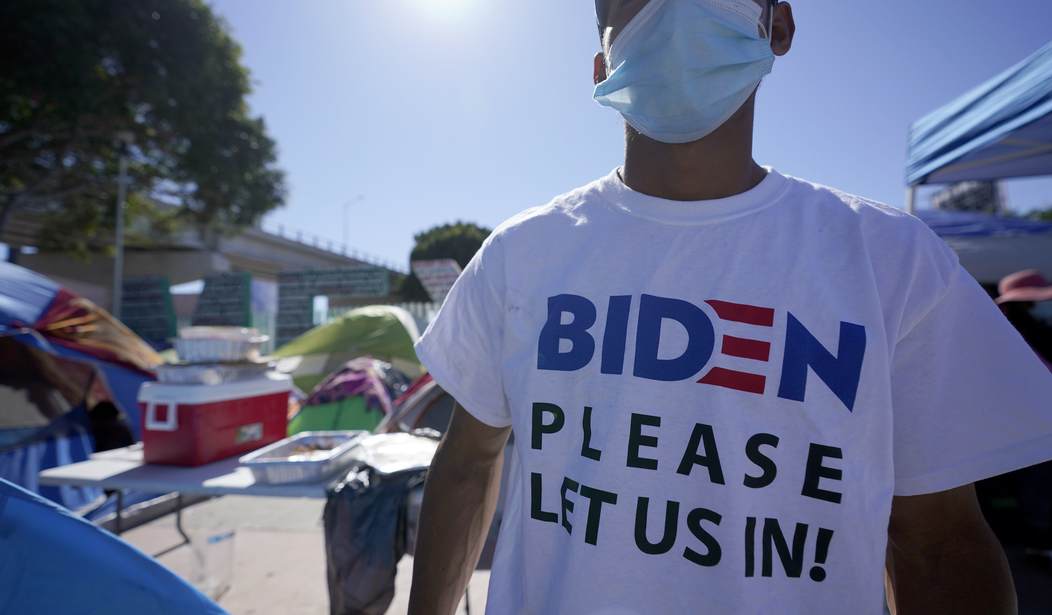Democrats are trying to load up their $3.5 trillion budget proposal with as many bells and whistles as they can fit into it. That includes some radical immigration changes that would lead to a “path to citizenship” for millions of illegal aliens.
There are some towering obstacles in their way. But since they plan to use the reconciliation process to ram the bill through, anything is possible.
Needing all 50 Democrats in the Senate to approve the measure may be the biggest hurdle of all. Some of the more moderate Democrats might not be able to swallow some of the bill’s proposed changes to immigration.
Sen. Bob Menendez, D-N.J., the lead author of a sweeping immigration bill that reflects President Joe Biden’s vision, said Thursday that Democrats are exploring immigration changes worth $120 billion in the budget reconciliation measure, which can pass without Republican support.
Menendez said Democrats will seek to allow a path to legalization and green cards for certain “Dreamers,” farmworkers, essential workers and people on Temporary Protected Status.
“That’s not everything that my U.S. Citizenship Act would do, but it would be a very big down payment,” Menendez said, adding that the goal is “to be as expansive as we can on immigration reform.”
Related: Joe Biden Finds Some Refugees He Doesn’t Want: Cubans Seeking Freedom From Communism
Senate Democrats are probably united in allowing a path to citizenship for the children of illegals who have been here since childhood — the “Dreamers.” But who is to be considered an “essential worker”? I doubt whether grocery store clerks are still “essential” now that all the stores are fully open and the threat of Covid-19 infection has all but disappeared.
And TPS is a very broad category. It includes victims of a natural disaster who are here illegally. In reality, TPS is rarely withdrawn in a timely manner so someone who was displaced a decade ago by a hurricane or earthquake might still be eligible.
The problem with getting the bill passed with the immigration changes has to do with receiving approval from the Senate’s parliamentarian, Elizabeth MacDonough.
Democrats face serious obstacles. All 50 senators who vote with the Democrats, along with a majority of the House, would have to agree to any policy changes for them to become law.
And Menendez conceded that it is unclear what measures the Senate parliamentarian would allow under the “Byrd rule,” which restricts the reconciliation process to changes in spending and taxes.
“How far do we want to go? We want to go as far as we can, assuming the parliamentarian allows it to happen,” Menendez said. “It has tremendous budget effects. It will provide revenue to the federal Treasury because of the fees and taxes people will pay. It will also have some costs.”
Republicans say that the immigration changes would only be “incidental” to the budget and therefore wouldn’t meet the stiff test of the Byrd Rule on what could be included in a reconciliation bill.
“Reconciliation is designed as a budget thing and not necessarily a policy issue. So I think they’re going to have a very difficult time getting immigration in,” said Sen. Mike Rounds, R-S.D.
MacDonough has already stirred up controversy by excluding a provision from the pandemic relief bill passed last March that would have raised the federal minimum wage to $15 an hour. Democrats called for her firing at the time. She has also ruled that there is a limit to the number of reconciliation bills that can be introduced per session. Both rulings were of immense help to Republicans, although MacDonough was appointed by former Senate Majority Leader Harry Reid in 2012.
But the parliamentarian may not even need to rule on the changes if Democrats aren’t completely united on the immigration provisions. At this point, that would appear to be a long shot.










Join the conversation as a VIP Member